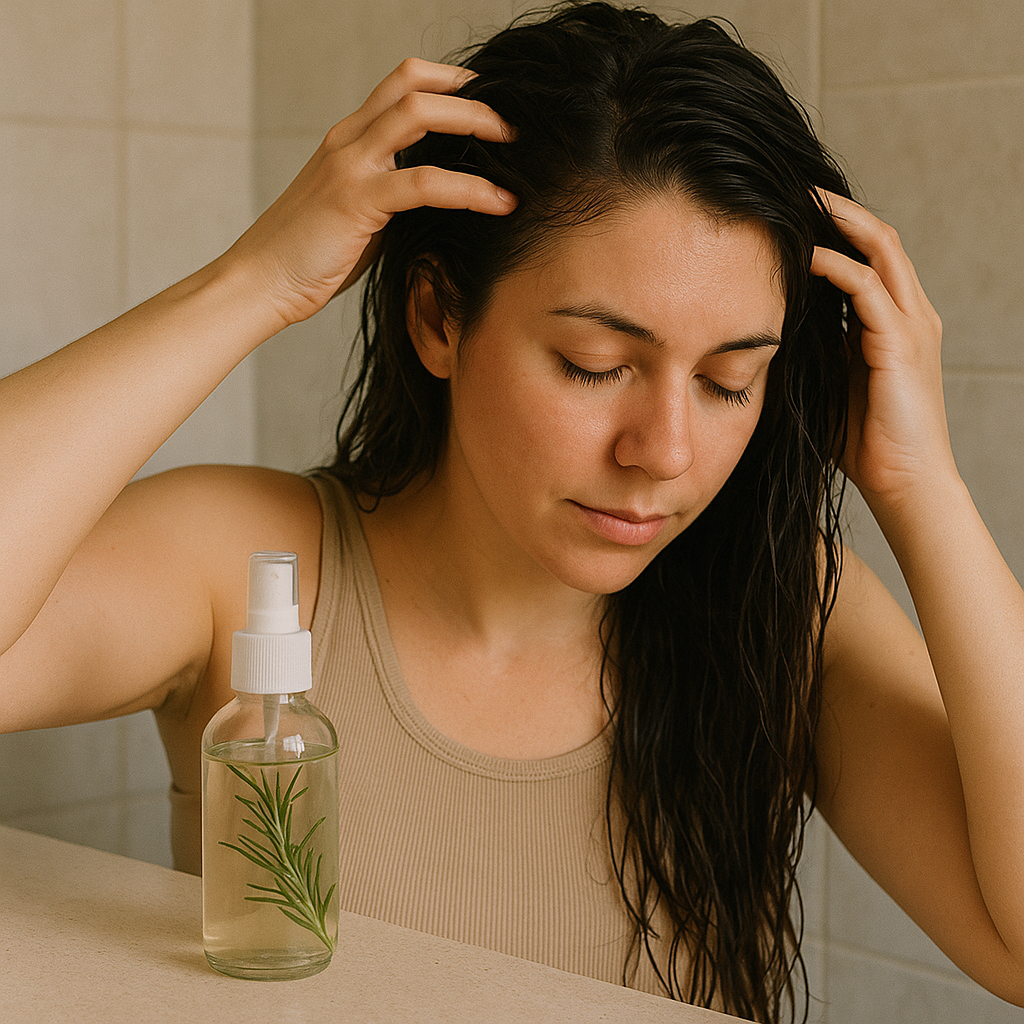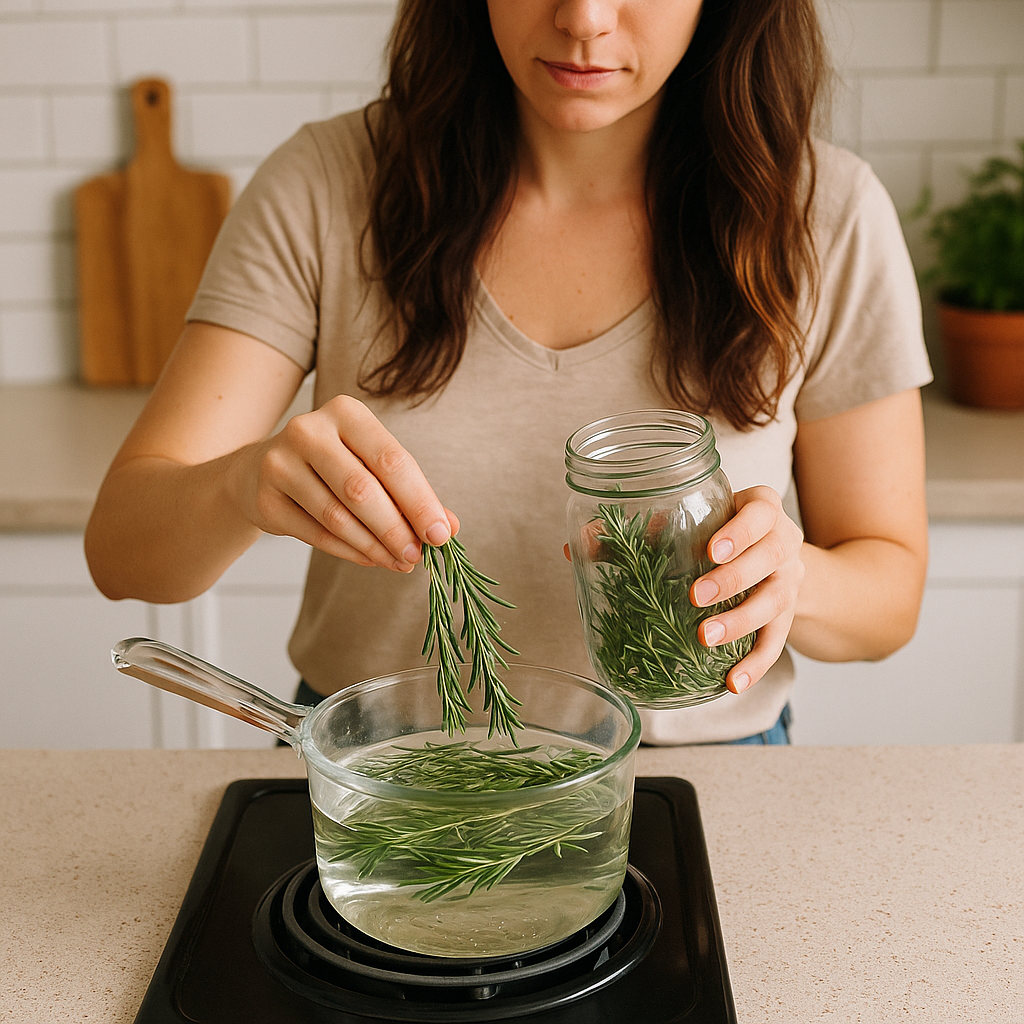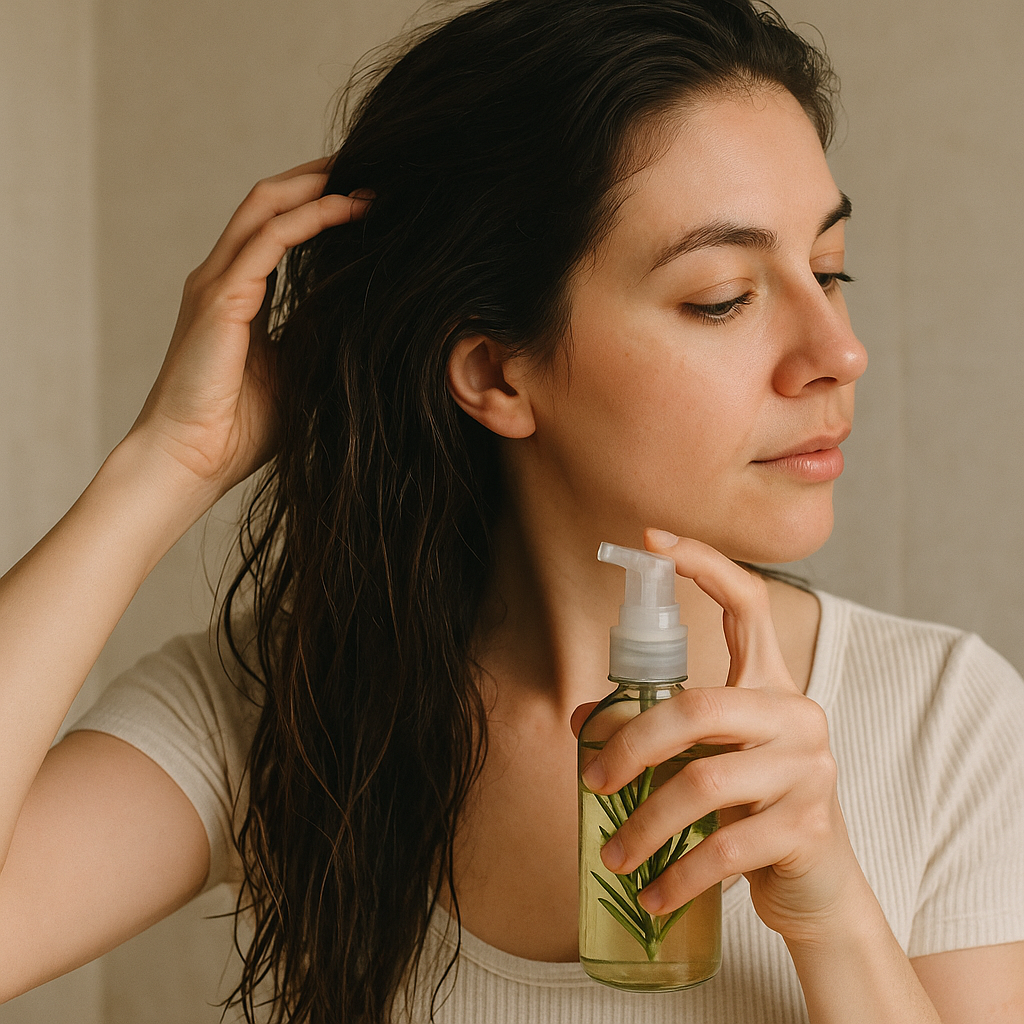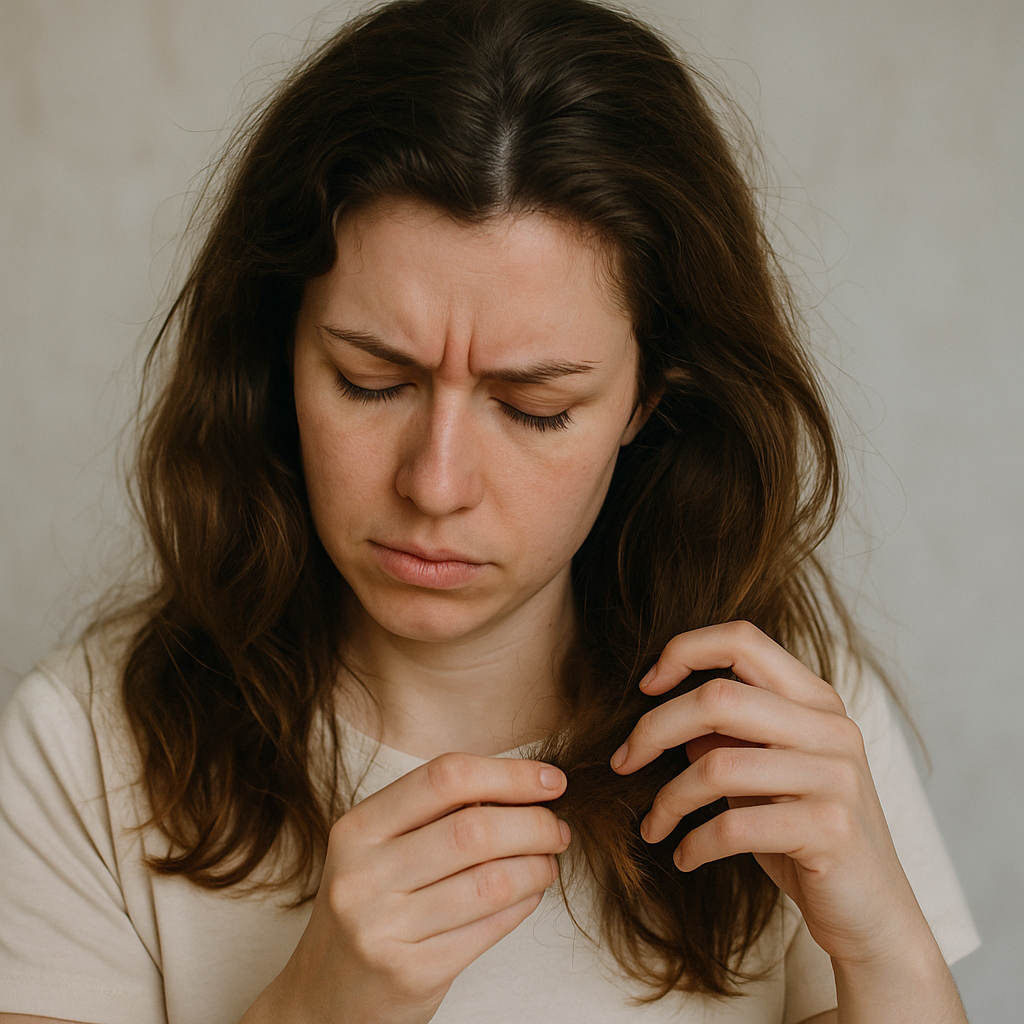How to Use Rosemary Water for Hair Growth: Ayurvedic Guide and Recipes

If you've been searching for a natural way to promote longer, stronger, and shinier hair, you’ve probably come across rosemary water for hair growth. This age-old remedy is making a big comeback — not just in DIY beauty circles, but also in Ayurvedic practices and natural wellness communities. But how to use rosemary water for hair growth effectively? Is it just hype, or does rosemary really help your hair grow faster and thicker?
In this comprehensive guide, we’ll explore everything from how to make rosemary water for hair growth at home to how to apply rosemary water to hair the right way. Plus, we’ll dive into the benefits, the science, the potential side effects of rosemary water on hair, and even a tried-and-true rosemary water for hair growth recipe. If you're curious whether it’s right for you (and how long it takes to work), keep reading.

Why Rosemary Water Is Used for Hair Growth
Rosemary water isn't just a trendy internet remedy — it's backed by centuries of tradition and growing scientific interest.
Ayurvedic View on Rosemary
While rosemary itself is not native to India, it’s been embraced in modern Ayurvedic practice for its warming and stimulating properties. In Ayurveda, scalp issues and hair loss are often linked to imbalances in Vata and Pitta doshas. Rosemary, with its circulatory-boosting effects, is believed to energize the scalp, stimulate dormant follicles, and balance excess dryness or inflammation. It's often used in combination with other Ayurvedic herbs like bhringraj or amla for a more holistic approach.
How It Stimulates Hair Follicles and Scalp
From a scientific perspective, rosemary contains compounds like rosmarinic acid and cineole, which have anti-inflammatory and antimicrobial properties. These help cleanse the scalp, reduce buildup, and support a healthier environment for hair to grow.
More importantly, rosemary is thought to improve blood circulation to the scalp — kind of like giving your hair roots a wake-up call. This increased blood flow can encourage hair follicles to enter the growth phase (anagen) and potentially thicken over time. People often ask, “Does rosemary water help hair grow?” Well, research is still growing (no pun intended), but some studies show rosemary oil performs comparably to minoxidil (the active ingredient in Rogaine) in promoting hair regrowth.

Don't wait or self medicate. Start chat with Doctor NOW
How to Prepare Rosemary Water at Home
You don’t need to spend a fortune on fancy products. Making rosemary water for hair at home is incredibly easy and super cost-effective.
Simple Rosemary Water Recipe
Here’s a basic rosemary water for hair growth recipe you can try right now:
Ingredients:
-
1-2 sprigs of fresh rosemary (or 2 tablespoons dried)
-
2 cups of water
Instructions:
-
Boil the water in a saucepan.
-
Add rosemary, cover, and simmer for 15-20 minutes.
-
Let it cool, then strain into a spray bottle or jar.
Store in the fridge for up to a week. (Don’t forget to label the bottle... unless you like surprises.)
Optional Ingredients to Boost Effectiveness
Want to level it up? Consider adding:
-
A few drops of peppermint oil (also great for scalp circulation)
-
Lavender for soothing irritation
-
A splash of apple cider vinegar (balances scalp pH and fights dandruff)
Just be careful not to overdo it — the goal is nourishment, not a chemistry experiment gone wrong. 🤷

Application: How to Use Rosemary Water for Hair
You’ve got your rosemary water ready — now what? Knowing how to apply rosemary water to hair is just as important as making it. Here’s the right way to get started.
Step-by-Step Guide to Applying It
-
Start with clean hair – While rosemary water can be used on dirty hair, it absorbs best when your scalp is free from oil, buildup, and styling products.
-
Dry or damp hair? Either works, but many people prefer using it on damp hair post-shower — it acts like a leave-in toner for your scalp.
-
Section your hair – Use clips or your fingers to divide hair into parts, so the rosemary water can reach the scalp directly.
-
Spray or pour – Use a spray bottle to mist the scalp, or apply with a cotton pad if you don’t have one handy.
-
Massage gently – Don’t just apply and walk away. Spend 2–3 minutes massaging it in to boost circulation and absorption.
-
Let it sit – You can leave rosemary water in your hair — no need to rinse! Or, rinse it out after 30–60 minutes if you prefer.
-
Style as usual – Just avoid heat-styling right away; give your scalp a bit of a breather.
Some people like to use it as a final rinse after conditioning. Totally fine. The key is consistency, not perfection.
Usage Frequency and Duration for Results
How often should you use rosemary water for hair growth? Ideally, 3 to 4 times per week. Some folks even use it daily — which is okay, especially if your scalp tolerates it well.
But don’t expect miracles overnight. Hair growth is a sloooow process.
Benefits of Using Rosemary Water on Hair
Aside from promoting hair growth, rosemary water brings a ton of other perks for your hair and scalp health.
Hair Strengthening and Scalp Health
One of the biggest rosemary water for hair growth benefits is its ability to strengthen the hair shaft. It helps reduce breakage and prevents split ends — which, ironically, can look like your hair isn’t growing when it’s actually just breaking off.
It also has natural antifungal and antibacterial properties, making it great for people who struggle with dandruff, scalp acne, or itchiness. A happy scalp is a fertile ground for hair, after all.
Texture, Shine, and Volume Enhancements
If you’ve been dealing with dull, limp hair, rosemary water may just become your new favorite thing. Regular use can:
-
Make strands feel softer
-
Add natural shine (not the greasy kind!)
-
Increase bounce and fullness
Honestly, even if it didn’t help with hair growth (which it does, by the way), it’s still a fantastic tonic for overall hair health.
How Long Does Rosemary Water Take to Work?
Here’s the million-dollar question: how long does rosemary water take to grow hair?
You might notice subtle changes in hair texture and shine within 2–4 weeks. But for actual growth — we’re talking noticeable length or thicker patches — give it 3 to 6 months, minimum.
Consistency is the name of the game. Think of rosemary water like a gym membership for your scalp: if you skip too often, don’t expect results. 😉
Some people even track their progress with monthly photos. It’s a great motivator, especially when it feels like nothing’s happening (trust me, something is).

Side Effects and Precautions of Rosemary Water Use
Okay, so rosemary water for hair sounds pretty amazing — but what about the downsides? Yep, even natural remedies can have side effects, and it’s important to be aware of them before going full herbalist on your scalp.
Possible Side Effects of Rosemary Water on Hair
-
Scalp Irritation – For some folks, especially those with sensitive skin, rosemary can cause redness, itching, or dryness. Always do a patch test before going all-in.
-
Allergic Reactions – Though rare, allergic responses can happen. If you notice hives, swelling, or a rash, stop using it immediately.
-
Dry Hair – Ironically, using rosemary water too often — especially without balancing oils or conditioners — might dry out your hair over time.
-
Overpowering Scent – Okay, this isn’t a medical issue, but rosemary has a strong, herbal smell that not everyone loves. You’ll either feel like a fancy spa… or a roast chicken.
And hey — if you're wondering about the long-term effects or whether it’s safe for color-treated hair, it generally is. But it’s still best to consult with a dermatologist if you have pre-existing scalp conditions or are unsure.
Conclusion
So, does rosemary water help hair grow? The short answer is: yes, for many people, it absolutely does — especially when used consistently and correctly. Whether you're trying to fill in thinning areas, boost overall length, or just want shinier, fuller hair, rosemary water is a natural, affordable, and surprisingly effective solution.
We’ve covered:
-
How to make rosemary water for hair growth
-
How to use rosemary water for hair (and how often)
-
What to expect in terms of timing and results
-
Side effects of rosemary water on hair to watch out for
Now it’s your turn to try it out — maybe even tweak your own rosemary water for hair growth recipe with a few add-ins that work for you. Just remember: your hair journey is yours alone. Don’t stress over perfection.
FAQs
Is it good to spray rosemary water on hair every day?
Yes, as long as your scalp tolerates it. Daily use can be beneficial for some, especially if diluted properly. But if you notice dryness or irritation, scale it back to 3–4 times a week.
What are the disadvantages of rosemary water for hair growth?
Besides possible irritation or dryness, one big drawback is that results can be slow. It’s not a miracle overnight fix, so patience is key.
What happens if I stop using rosemary water?
If you stop, you may gradually lose the benefits you gained — such as improved texture or reduced shedding. Think of it like skincare: maintenance matters.
Will rosemary water darken my hair?
In some cases, yes — rosemary has natural darkening properties and may slightly deepen hair color over time, especially for people with light brown or graying hair. That said, it won’t turn blonde hair black or anything drastic.
Final Thoughts
If you’re tired of chemical-heavy hair products or treatments that don’t deliver, rosemary water for hair growth might just be the natural answer you’ve been looking for. It's easy to make, gentle on the scalp, and backed by both tradition and science.
So why not give it a try? Brew a batch, stick with it for a few months, and let nature do its thing. Got friends struggling with hair issues? Share this guide — they’ll thank you later!
Got any more questions?
Ask Ayurvedic doctor a question and get a consultation online on the problem of your concern in a free or paid mode.
More than 2,000 experienced doctors work and wait for your questions on our site and help users to solve their health problems every day.

